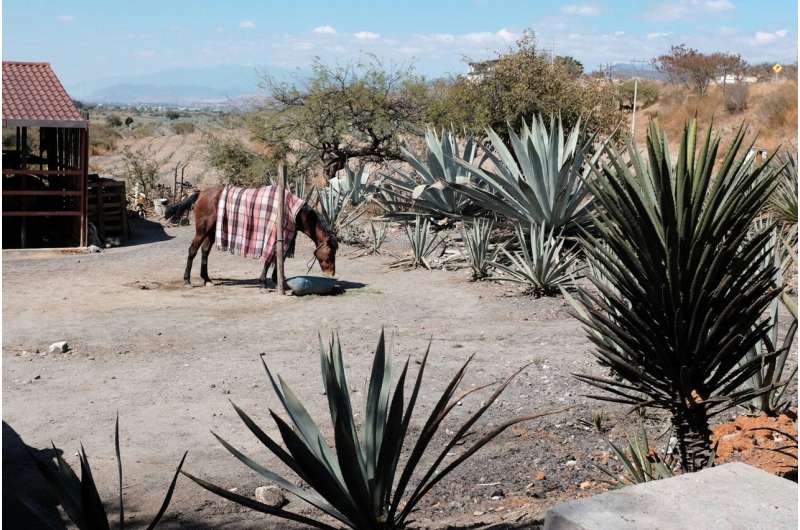This article has been reviewed according to Science X's editorial process and policies. Editors have highlighted the following attributes while ensuring the content's credibility:
fact-checked
trusted source
written by researcher(s)
proofread
International development can tackle the climate and migration crises together

Without immediate action to help the world's most vulnerable people adapt to climate change, millions face the prospect of their homes becoming unlivable, with no option but to leave.
Take the "dry corridor" of Central America, which stretches from Nicaragua in the south to the Mexican border in the north. Home to nearly 12 million people, the region is in the throes of yet another mega-drought. Recent heat waves here have lasted months, sparking winter wildfires and drying up freshwater and soils.
The consequences, which have yet to be fully realized, will almost certainly include major crop losses and food shortages that could spur violent conflict and mean more desperate families on the move.
Yet, by researching nature-friendly forms of farming rooted in the region's Indigenous cultures (often referred to collectively as agroecology), I've learned that extreme weather needn't end in tragedy. The right kind of actions can help people adapt to and even mitigate climate change, while giving them economic incentives to keep them from migrating.
A green economy in action
Since 2009, I've worked in the Maya-Achi territory in central Guatemala. Like elsewhere in the Dry Corridor, climate change has increased the frequency of heat waves at all times of year here and made wet seasons more erratic. As a result, small-scale agriculture, the principal livelihood, is extremely difficult.
Climate change has also exacerbated existing problems, such as inequality, the dependency of farmers on expensive and polluting chemical fertilizers and fallout from the civil war of the 1980s which tore communities apart. These factors have caused an exodus of young people from the region in search of opportunities elsewhere.
I've learned a lot from the Maya Achi, an ethnic group indigenous to Guatemala. I've discovered how ancestral knowledge about the local ecology can promote healthy soil management. I have seen how community organizations contribute to sustainable livelihoods, with programs that restore and in some cases reintroduce native foods and crop varieties, such as heritage maize and amaranth, which experts have found to be drought-tolerant and highly nutritious.
I've also witnessed the success of local groups in coordinating hundreds of Indigenous families to pursue agroecology, which includes regenerating degraded forests and watersheds. This has allowed farmers to grow more food as the prevalence of shade, moisture and healthy soil has improved, making small-scale farming more viable.
It's no secret that strong social networks help boost resilience in agricultural communities. In our recent article, education scholar Michael Bakal and I argued that Maya-Achi organizations, such as Qachuu Aloom, a local farmer and seed-saving association, are ideally placed to take on the climate and migration crises.
Not only do these organizations understand the needs and values of their communities, they also advance a model of economic development that enhances rather than destroys the environment—precisely the kind of green economy that is being called for internationally.
Each year, billions of dollars are spent globally on development projects which are supposed to improve conditions in areas like the Dry Corridor. Increasingly, funds are earmarked for building resilience to climate change, including farming projects that introduce new technologies, crops and practices.
As useful as some of these efforts have been, in the Maya-Achi territory, many programs initiated by foreign governments and charities have not left a positive legacy. Often this is due to a lack of consultation with local people and community leaders, the continued gifting of chemical fertilizers and non-native seeds which farmers become dependent on and the use of food aid, which is often unnecessary and culturally insensitive, disrupting as it does local food production and diets.
I have also heard criticisms from family farmers about the unrealistic expectations from simplistic (though expensive) projects that last, at most, two years. As one community leader put it: "They give us a shovel and expect everything to change overnight."
Not all international assistance and development programs have failed to improve local conditions. Yet, it's clear that to meet the urgency of the climate and migration crises, a change is needed. Some researchers insist that governments subsidize agroecological farming in areas hard hit by climate change, and that traditional and Indigenous techniques and crop varieties be at the heart of national campaigns to make communities more resilient.
Instead of importing ideas and projects to climate-vulnerable regions, we propose a new vision of development based on the values and well-being principles of local and Indigenous communities. This would mean development rooted in healthy food and farming landscapes, tight-knit communities of mutual support, and reverence for nature—principles originating from the philosophy of Buen Vivir, also called "Utziil Kasleem" in the Maya-Achí language.
As hundreds of millions of US dollars become available for development, with schemes aimed at tackling migration at its source, there is enormous potential to support local climate action: reforestation and agroecological farming, new markets for local products and ancestral practices blended with newer technologies, helping farmers adapt to changing conditions. An example might be improved composting methods and biological fertilizers derived from leaves and crop residues.
Development aid raised internationally could be much better spent by mitigating climate change and helping vulnerable communities stay together. Wealthy nations and organizations must listen to and learn from local people, supporting their existing projects and allowing them to reach their potential.
Provided by The Conversation
This article is republished from The Conversation under a Creative Commons license. Read the original article.![]()




















